Center for Mathematics Education (CFME)
Doctoral Students

Nora Belfedal earned both a BS and an MS in mathematics. She has been teaching at all levels and lately more at the college level.
She also worked mentoring and coaching teachers/principals in mathematics. Her interests center in improving math education using technology and making it accessible to all in particular to underserved populations.
Victoria Fernandez was born in Miami, Florida but has lived most of her life in North Carolina. She graduated from UNC Charlotte with a Bachelor's degree in Special Education and taught for six years in middle school as a special education math teacher. After teaching, she worked as an instructional coach and earned her Master's degree in Sociology and Education from Teachers College at Columbia University. Victoria combined her passion for the students she taught, love of math, and sociological imagination to come to University of Maryland to study sociocultural issues in math education. She hopes to better understand why everyone hates math so much on a systemic level.
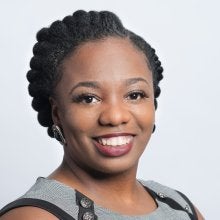
Francesca Henderson is from Southern California an holds a Bachelor's of Mathematics from San Diego State University (2011), a Master's in Mathematics Education from Concordia University in Portland Oregon (2015), and a Master's degree in Educational Leadership from the High Tech High Graduate School of Education in San Diego (2018). During her professional career she has served as a researcher, 9-12 math teacher, Vice Principal, and Education Consultant. Through her diverse experiences in education, she developed a passion for social justice and equity. Thus, her research interests are embedded in social justice mathematics education, the transition from high school to college-level mathematics learning, and culturally responsive pedagogy.
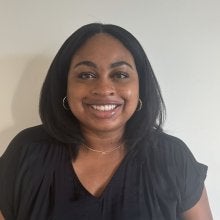
Jade A. Johnson is a New Jersey native with a BS in Integrated Elementary Education and Special Education from Towson University and an MA in Educational Leadership and Administration from The George Washington University. Her experience includes roles as a classroom teacher, a Mathematics Resource Teacher, and a Magnet School Coordinator at a K-5 magnet school. Jade's research interests include exploring the intersection of race, gender, and class in mathematics education and how these elements impact student achievement and future career goals. She is particularly interested in the history of mathematics, empowering black girls to form a strong mathematical identity in their elementary years and developing teaching practices to foster student agency in the mathematics classroom.
Michael W. Krell is a Maryland native who holds a BA in philosophy and the history of math and science from St. John’s College and an MA in German and European studies from Georgetown University’s School of Foreign Service. He spent five years teaching secondary STEM courses in the International Academy at Cardozo Education Campus in Washington, DC, where he created and adapted curriculum focused on serving multilingual learners, led professional development sessions at the district level, served as mathematics department chair, and completed a Modern Classrooms Fellowship in 2019-20. Prior to becoming a teacher, he worked in the field of international development. His interests center on multilingual learners in the secondary mathematics classroom.
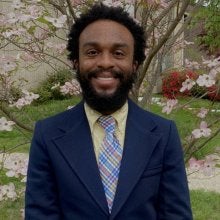
Milen M. Matthews is a native of Louisiana with a Bachelor’s of Elementary Education from The University of Louisiana in Lafayette and a Master’s in Educational Leadership and Administration from Lamar University in Beaumont, Texas. During his professional career he served as a 1st-6th grade math and science teacher, Assistant Principal, School Community Liaison, and Black Boy Mentor. As a Black male educator in a predominately white, female profession, Milen has developed research interests that embody diversity and equity in early childhood & elementary mathematics classrooms, impacts on student identity for youth of color, and the recruitment & retention of Black male teachers.
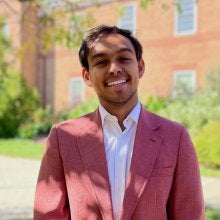
Alejandro Royo Romero is a doctoral student in the department of Teaching and Learning, Policy and Leadership with an emphasis in Mathematics Education at the University of Maryland. He holds a master’s in Teaching in Secondary Mathematics from Loyola University Maryland, a master’s in Physics from Bowling Green State University, and a bachelor’s degree in Mathematics and Physics from High Point University. His current research focuses on how policies, teacher pedagogies, and classroom ecology impact multilingual-multicultural students’ outcomes in K-12 mathematics. Luis is a former high school math teacher and undergraduate physics lab instructor.

Matt Wilson, a Maryland native, graduated from Washington University in St. Louis with a bachelor's in Mathematics in 2016 and earned a Master's degree in Math Education from University of Maryland. On campus, he has been an instructor in the Developmental Math and uTERP programs since 2018. His research interests lie in the intersection of curriculum, cognition, and equity. Thus, Matt is passionate about queer, feminist, and critical math pedagogy and empowering underrepresented populations in STEM fields.
Mary Ziegler Zimmerman earned her BFA in Studio Art from Truman State University and M.Ed in Curriculum and Instruction from the University of Washington. After working in outdoor education, she transitioned to teaching for Denver Public Schools, serving as a teacher and leader at the middle and elementary levels in mathematics and special education. Her experiences mentoring, coaching, and evaluating new and experienced teachers led to her interest in mathematics teacher education, teacher cognition, and implementation of equity-based mathematics instructional practices.
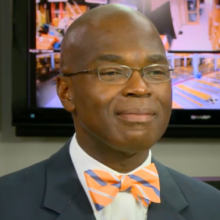
Sherwin Collette is the Senior Vice President for Montgomery College’s administrative and fiscal services. Collette formerly was an associate superintendent for Montgomery County Public Schools’ Office of Engagement and Labor Relations, according to a statement from Pollard. His research interests center on supporting community college students access mathematics education necessary to help them pursue their future endeavors.
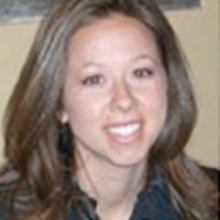
Kellyn Farlow-Morris has a bachelor's and a master's degree in Mathematics Education from Brigham Young University. Prior to attending UMD, she was an active participant in an ongoing research community doing research in mathematics education. During this time Kellyn worked on three different projects involving pre-service and in-service elementary school teachers and undergraduate students majoring in Dance. Her thesis research was based on data from an experimental teaching project with dance students. These students were invited, through real-world problem tasks that raised central conceptual issues, to invent major ideas of calculus. The focus of Kellyn's research was on the work and the thinking of the students, as they sought to build key ideas, representations, and compelling lines of reasoning. Kellyn is still highly interested in student thinking, especially student proof development and representational use. She has continued to be a part of similar work here at UMD in both the Case Studies and Necessity Project research groups.

Matt Griffin's primary research interests are urban education, teachers' mathematical knowledge and mathematics education policy. He is also interested in the use of technology in mathematics education and students' learning of geometry. Before arriving at UMD, Matt taught secondary mathematics for four years and, prior to that, worked in the actuarial industry for over a decade.
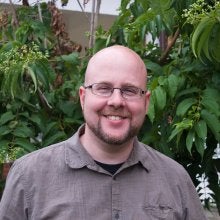
Josh Himmelsbach earned his bachelor’s degree in mathematics from Harvard, and taught middle and high school mathematics for five years in Rockville, MD. He then returned to school and earned a Master’s degree in Mathematics from the University of Maryland. While teaching as a graduate student he became interested in undergraduate mathematics and teacher prep curriculum. Josh is currently a full-time faculty member in the department of mathematics at the Catholic University of America.
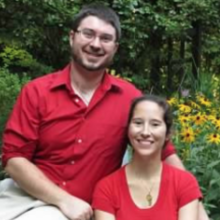
Chris Hurst is a UMD grad both for a Bachelor's in Mathematics and a Master's in Curriculum and Instruction, making him a lifelong Terps fan. He also currently teaches Pre-Calculus, AP Calculus, and AP Economics at DeMatha Catholic High School in Hyattsville, MD. He is interested in the influence of policy on mathematics classrooms, specifically regarding teacher professionalism issues in both public and nonpublic schools. He lives in Bowie with his wife Alison, children Sean and Nora, and part-yellow lab-part-hurricane Hunter.
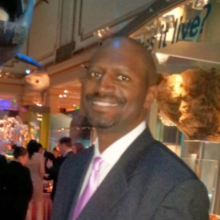
Darren Smith is a math professor at Montgomery College, Germantown campus. He has served as department chair and been a critical member of the Collegewide Assessment Team that identifies needs and develops recommendations regarding college-wide assessment of student learning in order to strengthen the college and enhance its accountability. Darren’s research is centered around how math tutoring serves as a gateway for future mathematics teachers.